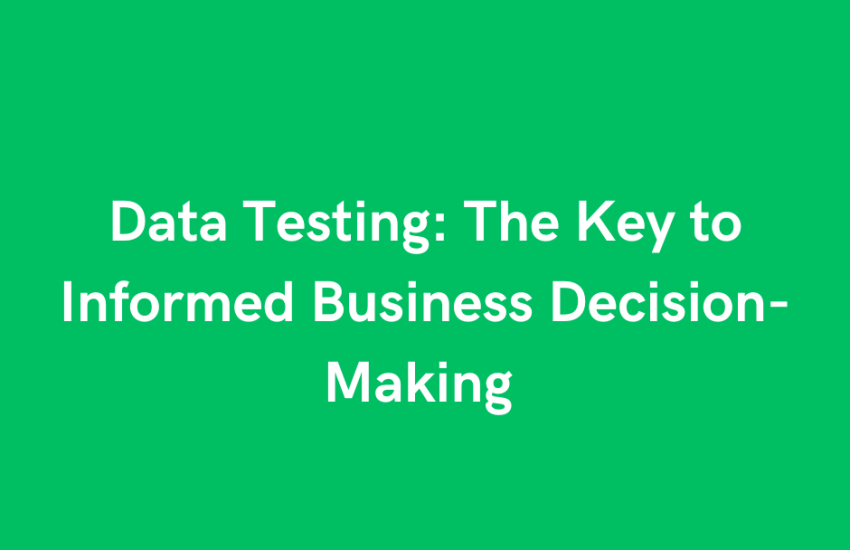In today’s dynamic digital business landscape, data plays a pivotal role in delivering personalized services efficiently and enhancing user experiences. Organizations are well aware that the quality of their data directly influences decision-making processes, return on investment (ROI), innovation efforts, and overall operational efficiency. As businesses increasingly rely on data-driven decision-making, the quality of data. The data becomes a critical factor in determining their success.
Implementing data testing has become imperative for businesses operating in an environment powered by artificial intelligence (AI), advanced analytics, and big data. Studies indicate that organizations investing in to experience fewer errors, heightened user satisfaction, and improved adherence to compliance protocols.
Why is Data Vital for Businesses?
Data serves as the foundation for informed decision-making and strategic business planning, enabling organizations to devise strategies based on robust insights and evidence. This leads to enhanced operational efficiency and the ability to understand user behavior, needs, and preferences through data analysis, ultimately allowing businesses to offer tailored services and foster long-term relationships with users.
Moreover, data plays a crucial role in comprehensive market analysis, aiding businesses in identifying emerging trends, adapting to market dynamics, and understanding competitive strategies. It also helps in risk management, empowering organizations to develop strategies to mitigate potential challenges. Additionally, data enables businesses to measure their performance, evaluating the efficiency of their processes and marketing strategies.
How Data Testing enhances Decision-Making?
It is a critical process in the data management lifecycle, ensuring that high-quality data is available for analytics, reporting, and decision-making purposes. By rigorously testing data for reliability, accuracy, and integrity, organizations can:
1. Reduce Error Rate:
- Identify and rectify data errors and inconsistencies before they impact operations.
- Minimize the risk of making erroneous decisions based on flawed data.
2. Enhance Data Insight Quality:
- Filter out inconsistencies and inaccuracies to provide clear and accurate business operation details.
- Improve decision-making by basing it on high-quality data and insights.
3. Optimize Performance:
- Identify bottlenecks, inefficiencies, and performance issues in data applications and systems.
- Improve data processing speed, customer experience, ROI, and cost-effectiveness.
Types of Data Testing Methods
Data testing encompasses various methods to validate different aspects of data quality. Common methods include:
1. Consistency Testing:
- Ensures data consistency across different databases or systems by defining and enforcing standards and rules.
2. Integrity Testing:
- Checks for data alterations, unauthorized access, and inconsistencies throughout the data lifecycle.
3. Regression Testing:
- Retests data components after modifications to ensure new changes do not introduce errors.
4. Completeness Testing:
- Verifies that all required information is present without missing critical data elements.
5. Validation Testing:
- Validates data against predefined rules, formats, and requirements to ensure suitability for processing and analysis.
Best Practices for Data Testing Implementation
Implementing data testing effectively requires adherence to best practices such as:
1. Clear Testing Approach:
- Define clear objectives and goals for data testing to ensure a focused and effective testing process.
2. Comprehensive Test Plan:
- Develop a structured test plan outlining testing steps, methods, data requirements, and points of contact.
3. Maintain Test Environment Consistency:
- Ensure stability and consistency in the test environment to obtain reliable and comparable test results.
4. Select the Right Testing Tools:
- Utilize appropriate testing tools aligned with testing objectives, such as validation, performance testing, and security checks.
5. Review and Update Testing Strategy:
- Stay updated with new testing methods, tools, and best practices to address evolving data testing challenges effectively.
Conclusion
Quality data is indispensable for informed decision-making, strategic planning, and achieving long-term success in today’s data-driven business environment. Implementing robust data testing strategies, including validation, consistency, integrity, completeness, and regression testing, is crucial for ensuring data reliability, integrity, and consistency. By investing in data testing, businesses can drive innovation, improve ROI, and stay competitive in a rapidly evolving digital landscape.




